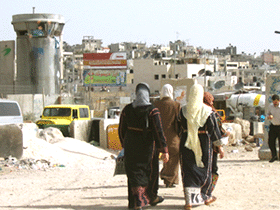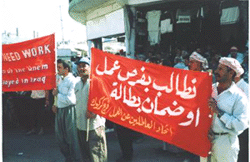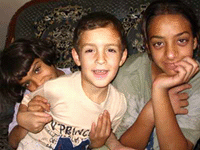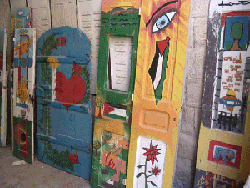
West Asia


Worker Unions in Iraq: An Interview with Amjad Aljawhary
Amjad Aljawhary is the North American Representative of The Federation of Worker Councils and Unions in Iraq. In this interview he discusses his union's main objectives, the US government's response to union organizing in Iraq, how the money for reconstruction is being spent, public opinion in Iraq regarding the presence of US troops there and what activists and workers outside of the country can do in solidarity to help Iraqi workers.

Heartbreak Hotel in Gaza
Prime Minister Ariel Sharon, military man gone peace-loving hippy, is unilaterally "disengaging" from the Gaza Strip. The hardships Israel is enduring are plastered all over the television, play by play. Scenes of Israeli soldiers, emotionally and physically struggling to remove the 8500 settlers from the Gaza Strip is displayed while CNN anchors utter soft, shocked words in the background. Images of Israeli soldiers painstakingly carry flailing settlers who are protesting the move. Their government once spent billions to protect and contain the animosity of 8500 people who once turned to them for help. But as the old saying goes, you break the law, you pay the price.

Palestine: A Tale of Two Families
In June, 2005 I visited the

Israel-Palestine: Solutions in the Midst of Crisis
International media has failed itself in covering the conflict in Israel and Palestine. Following the standard tenet, "if it bleeds, it leads," newspapers, radio, and the internet have continued to showcase the gore and ignore the solution-oriented work that many people in the region have dedicated themselves to. During a recent trip to Palestine, I stayed in the home of Fatima Khaldi in Qarawa Bani Hassan, a town in the West Bank continually threatened with the construction of the separation wall. Fatima founded and directs the organization Women for Life in the village of Biddya. Her group has a range of purposes, which revolve around empowering Palestinian women to take charge of their lives and become involved in politics. [Photo: Doors recovered from bombed homes, painted by children's art therapy group, Nablus, West Bank]

A People’s History of Iraq
Nearly 140,000 U.S. troops are currently in Iraq trying to influence Iraqi history by waging an imperialist war on behalf of U.S. corporate interests. Yet most people in the United States probably didn't learn very much about Iraqi history in their high school social studies courses. Some knowledge of pre-1950 Iraqi history may be of use to U.S. anti-war activists when arguing with opponents of an immediate withdrawal from Iraq.
